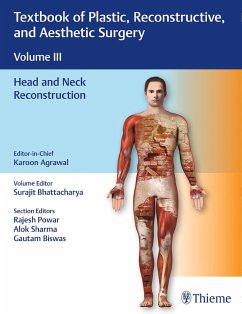Textbook of Plastic, Reconstructive, and Aesthetic Surgery is a comprehensive and illustrated work for students, teachers, and practicing surgeons.
It is a six-volume set with the topics of the volumes based on the clinical needs of plastic surgeons in developing countries. Along with latest developments, these volumes incorporate landmark contributions, innovations, and techniques used by Indian clinicians who regularly deal with unique and complicated conditions. While a majority of authors have been chosen from the Indian subcontinent, a few international authors whose work is considered indispensable for understanding the subject have also been included.
The six volumes seek to incorporate in one work issues relevant to the developing world as well as insights from national and international plastic surgery practices which highlight newer management techniques along with traditional methods. This makes these volumes a "must-have" resource for students and practitioners of plastic surgery across the globe.
This Head and Neck Reconstruction volume covers a wide spectrum of topics. It covers surgery techniques for reconstructions of clefts, treatment of craniofacial anomalies, onco-reconstruction, occuloplasty, and reconstruction of ear and nose. The team of authors has been carefully selected and they are highly experienced in their respective fields. The book is divided into three sections. The cleft section covers the entire gamut of clefts in detail, including operative steps and clinical photographs. The second and the third sections cover the recent advances in craniofacial anomalies and reconstruction techniques of head and neck section, respectively. Each topic of the book is a must read for any plastic surgeon.
Salient features:
- Includes important chapters on topics like "approach to the patients of cleft" and "aesthetic oncoreconstruction".
- Provides historical background of each topic along with recent advances and clinically relevant information.
- Untangles the mysteries of decision making in many areas of head and neck reconstruction.
- Adequate emphasis is given to the basic sciences relevant to each chapter.
It is a six-volume set with the topics of the volumes based on the clinical needs of plastic surgeons in developing countries. Along with latest developments, these volumes incorporate landmark contributions, innovations, and techniques used by Indian clinicians who regularly deal with unique and complicated conditions. While a majority of authors have been chosen from the Indian subcontinent, a few international authors whose work is considered indispensable for understanding the subject have also been included.
The six volumes seek to incorporate in one work issues relevant to the developing world as well as insights from national and international plastic surgery practices which highlight newer management techniques along with traditional methods. This makes these volumes a "must-have" resource for students and practitioners of plastic surgery across the globe.
This Head and Neck Reconstruction volume covers a wide spectrum of topics. It covers surgery techniques for reconstructions of clefts, treatment of craniofacial anomalies, onco-reconstruction, occuloplasty, and reconstruction of ear and nose. The team of authors has been carefully selected and they are highly experienced in their respective fields. The book is divided into three sections. The cleft section covers the entire gamut of clefts in detail, including operative steps and clinical photographs. The second and the third sections cover the recent advances in craniofacial anomalies and reconstruction techniques of head and neck section, respectively. Each topic of the book is a must read for any plastic surgeon.
Salient features:
- Includes important chapters on topics like "approach to the patients of cleft" and "aesthetic oncoreconstruction".
- Provides historical background of each topic along with recent advances and clinically relevant information.
- Untangles the mysteries of decision making in many areas of head and neck reconstruction.
- Adequate emphasis is given to the basic sciences relevant to each chapter.

